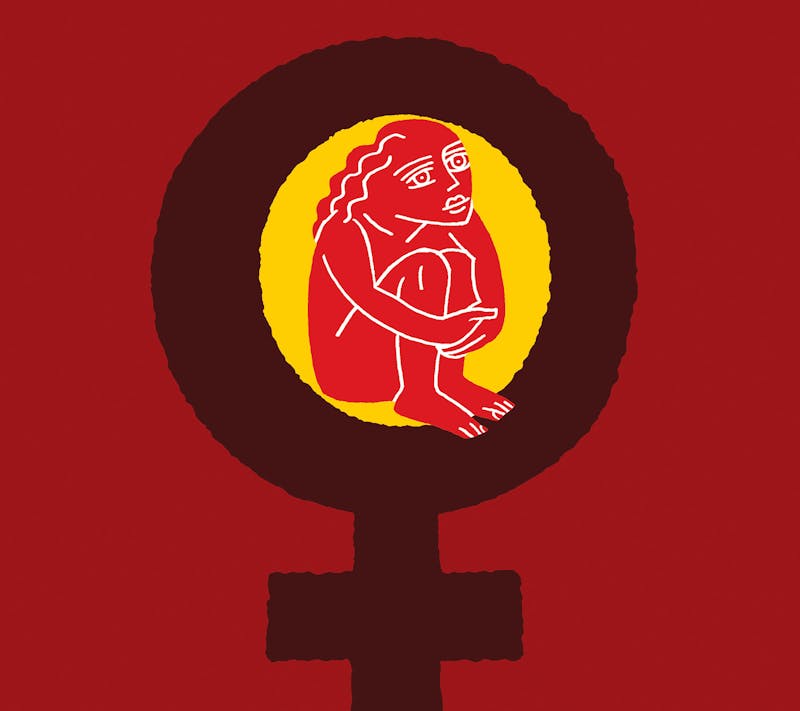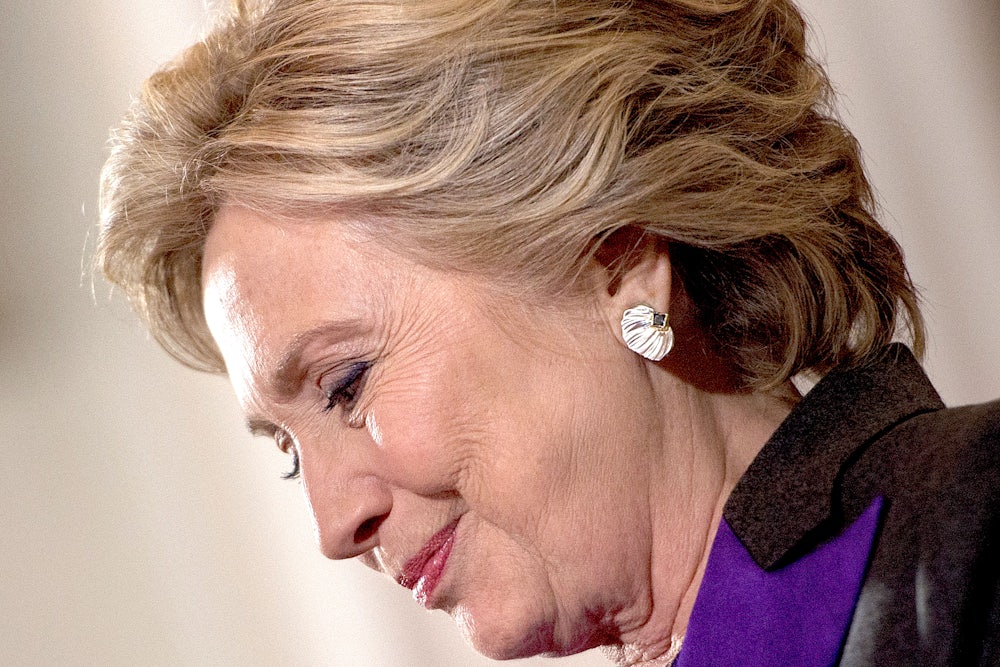On paper, at least, 2016 looked to be a banner year for feminism. As the GOP primary field succumbed to Donald Trump’s insurgency, Hillary Clinton’s march to the White House seemed all but inevitable. Discussions about rape on college campuses, workplace harassment, pay disparity, and other feminist issues finally broke through to the mainstream. A-list celebrities began embracing the word feminism—a significant shift after decades when feminists were little more than pop-culture punch lines, derided for their humorlessness, earnestness, and ideological single-mindedness. Seemingly overnight, feminism had become fashionable. Pop stars used the word to sell records, guys used it to get laid, models used it to push product, writers used it to advance their brand.
Like all fashions, it passed. And like all fashions, it turned out to be a frivolous, cosmetic change, completely divorced from the actual lived experience of most women. Instead of the first female president, we now have an accused sexual predator in the highest office in the land and a proud misogynist homophobe as his deputy and de facto head of domestic policy. Even more startling, in a way, are the exit polls showing that 53 percent of white women voted for Trump—and that many of those same women consider themselves feminists.
How did we get to this point? How could a majority of white women choose Trump over the first woman to serve as the presidential standard-bearer for a major political party—and call themselves feminists while doing so?
Now that we appear poised to lose much of the ground women have gained over the last 40 years, many feminists have taken a cue from Trump and gone on an aggrieved blaming binge of their own, chalking up the colossal political failures before us to the entrenched misogyny of America’s voters. But that, too, is a fashionable distraction. The fault here lies with mainstream feminism itself.
Over the past several decades, the gap between mainstream feminists and the daily realities of most American women has grown wider and deeper. Feminism, as our most prominent, mediagenic feminists practice it, does little to address the struggles of poor women, rural women, working women—women, in short, who live outside the sophisticated urban bubbles that mainstream feminists inhabit.
That gap was embarrassingly obvious in the aftermath of Hillary Clinton’s defeat. Performance artist and feminist commentator Amanda Palmer, for one, proclaimed that the Trump presidency would be really, really great for artists. “Having studied Weimar Germany extensively—I’m like, ‘This is our moment!’ ” she exulted, right before announcing that she was moving to Australia. Girls star and feminist pundit Lena Dunham hit the rock bottom of elite feminist cluelessness by cavalierly dismissing the emotional and physical suffering of many women who have terminated unwanted pregnancies. “I still haven’t had an abortion,” Dunham said on her podcast, “but I wish I had.”
Feminist commentators like Lindy West, Jessica Valenti, and Sady Doyle offered up a nonstop litany of mass recrimination, insisting that Clinton lost solely because of our culture’s deep-seated racism and misogyny. “Half of the country,” Rebecca Traister concluded in New York, “would prefer to return to the Founders’ original vision, with people of color and women on the margins and white men restored to their place at the center.” This line of argument conveniently overlooks the more than 29 million women who voted for Trump—women who felt they would be better served by a preening beauty-pageant purveyor than by the most accomplished female politician of her generation.
The root of the problem is that feminism has abandoned its core insight. Radical feminists traditionally believed that the patriarchy was inextricably intertwined with capitalism: that the entire structure of our society was based on the exploitation of the poor, women, and nonwhite races. The liberation of women entailed nothing less than the overthrow of old systems based on competition, greed, and power.
There is still a radical wing in feminism. Every day, activists and organizers are working to improve women’s access to family planning services, mounting nonprofit efforts to counteract the steady rollback of the welfare state, and combating the neoliberal policy consensus that consigns women—and men and children—to acute conditions of inequality and precariousness. But all that slow, thankless work has been eclipsed by the more prominent voices of mainstream feminism.
To reclaim the truly radical spirit of American feminism, we should call mainstream feminists something more anodyne: “pro-woman.” The designation seems fitting, since mainstream feminists work to shore up the status quo, seeking equal access to the system of oppression. That explains why one of the buzzwords favored by pro-woman commentators is self-empowerment—a term that gained currency on the right in the 1980s to characterize the individual’s obligation to take responsibility for her position in life.
Like much of the policy rhetoric of the Reagan and Thatcher revolutions, “empowerment” provided a feel-good evasion of the consequences of a society-wide breakdown in solidarity—and an excuse for overlooking all the ways that the social order sets women and racial minorities up to fail. As the rest of the political mainstream shifted in concert with the callow bootstrap social mythologies of Reaganism, so, too, did feminism: Workplace issues like equal pay and parental leave took a backseat to enlightened self-care and success. Second-wave feminist icon Gloria Steinem signaled this political sea change in her 1992 self-esteem tract Revolution from Within, and Oprah Winfrey expertly transmuted feminist political grievance into soft-focus nostrums of self-acceptance, using her own life story as a didactic case study in the miracles wrought by a gospel of female self-help. In 2010, when Facebook COO Sheryl Sandberg launched the Lean In franchise, her individualist handbook of corporate success, with a viral TED talk, she was mainly offering C-suite variations on what was by then a generation’s worth of self-healing feminist counsel aimed at getting ahead and staying there.
Under the sway of “self-empowerment,” feminist progress began to be measured accordingly: how many women serve as CEOs at Fortune 500 companies, or enjoy bylines at male-dominated magazines like The Atlantic, or gain admission to elite business schools. Much of mainstream feminist discourse likewise focuses on how best to empower yourself via money and work. The pro-woman power elite peers deeply into the savage inequalities of American life and asks, in essence, “Where’s my half of the profits?”
It was this single-minded pursuit that propelled Yahoo CEO Marissa Mayer into the state of corporate abjection that she now cites as a feminist parable: While at Google, she recounts, she was so hell-bent on besting her male competitors that she took to sleeping under her desk. But once she became the boss, she put a stop to employees working from home—thus making it harder for working moms to balance employment and parenthood. Within this cloistered, corporatized worldview, there’s precious little attention paid to what power should be used for, once it’s won, or what values we want to see governing our world. Working in your own self-interest is mistaken for a political act, and accruing money and power becomes an unquestioned feminist goal.

Herein lies a partial answer to the question of how Trump won a white female majority. Rightly or wrongly, the women who voted for Trump decided that it was in their self-interest to do so. And under the current logic of mainstream feminism, a vote for Trump can easily be depicted as a feminist act. “I have the right and capability to make my own decisions, and live the life I choose for myself,” one female Trump supporter told The Guardian. “A feminist does not blindly do what she is told—she thinks and makes her own choices.”
Well, of course—but this banal line of reasoning points to the very failures of the moral imagination that have locked mainstream feminism into its present privileged dead-end. When feminism can be used as a way to justify support for a candidate who boasts about groping women without their consent, and when broader female access to executive perches in Wall Street and Silicon Valley gets treated as some sort of movement-wide victory, then something clearly has gone wrong in our understanding of what feminism is and can do.
Society progresses reluctantly, only after a small group of the dedicated and the idealistic insist on it. Women won the right to vote in part because a handful of suffragists endured imprisonment and torture. During the heyday of second-wave feminism, while most women’s ambitions were confined to becoming wives and mothers, radical thinkers and reformers took up the fight against unequal pay and sexual harassment in the workplace and limits on abortions. Today we must continue that fight—not to place more women in the boardroom, but to construct ways of living and working that are measured by something greater than money and success. After Hillary Clinton’s defeat, it may look like women lost because we dreamed too big. In fact, women lost because we dreamed too small.
